新概念英语第一册Lesson101课件(共41张PPT)
文档属性
| 名称 | 新概念英语第一册Lesson101课件(共41张PPT) | 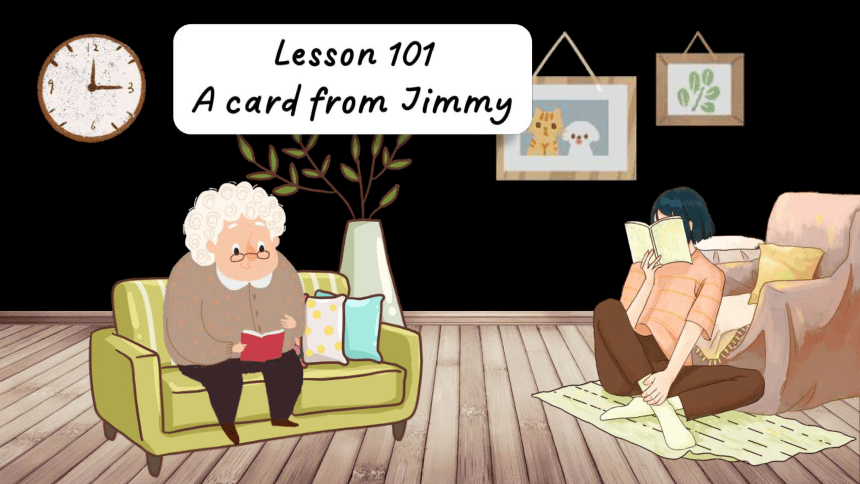 | |
| 格式 | pptx | ||
| 文件大小 | 110.4MB | ||
| 资源类型 | 教案 | ||
| 版本资源 | 新概念英语 | ||
| 科目 | 英语 | ||
| 更新时间 | 2023-10-29 14:19:17 | ||
图片预览

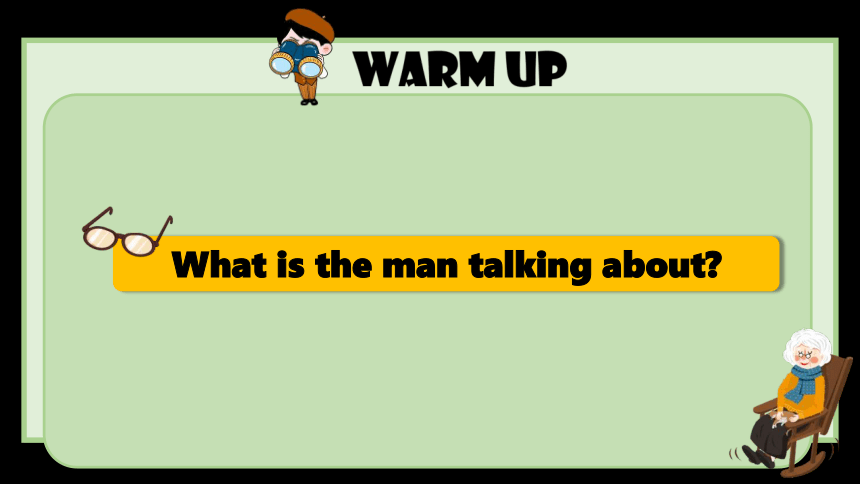
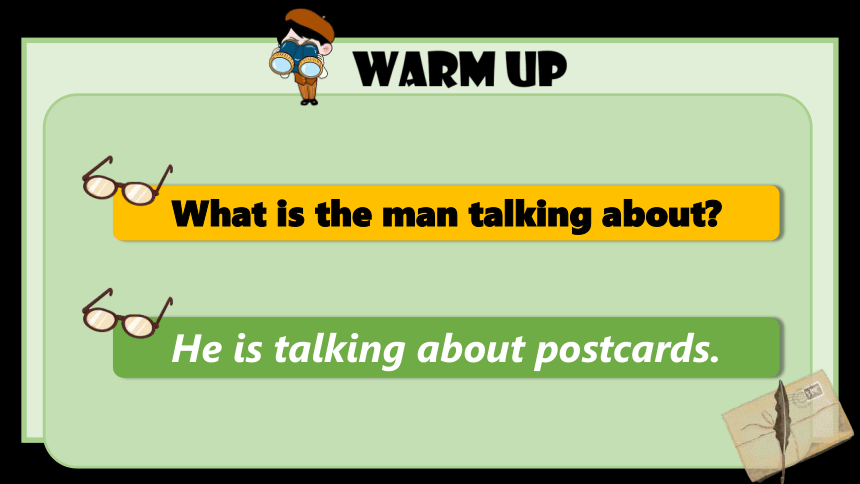
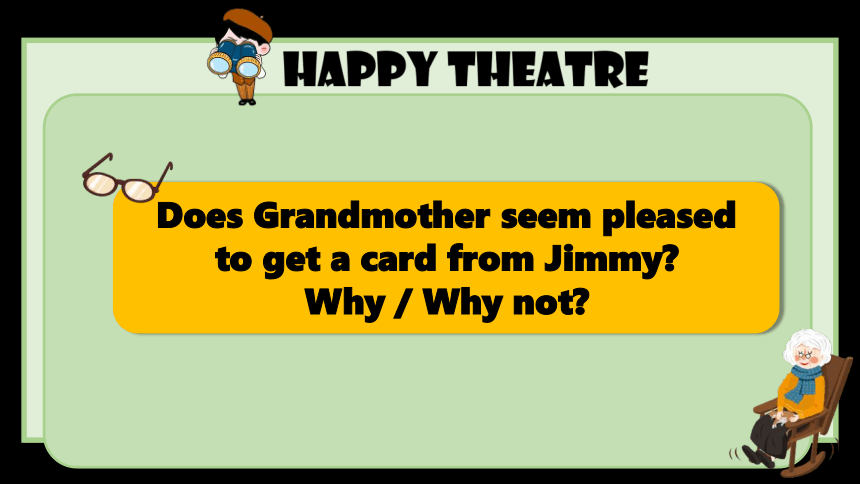
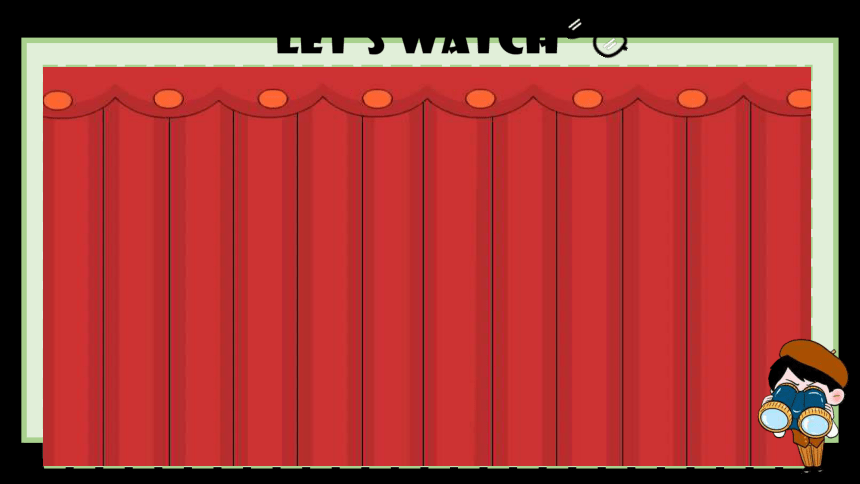
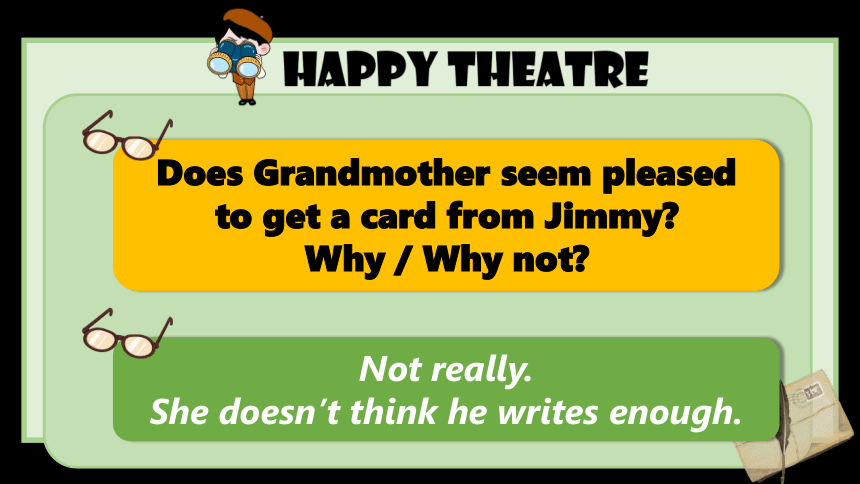

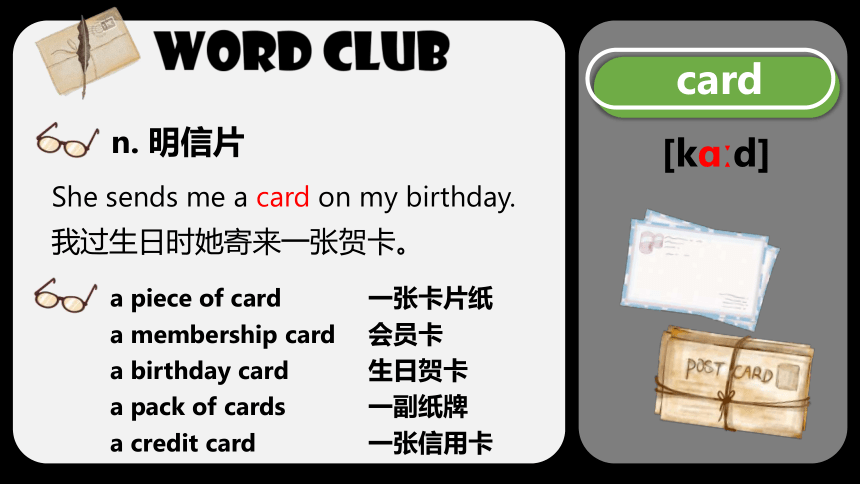
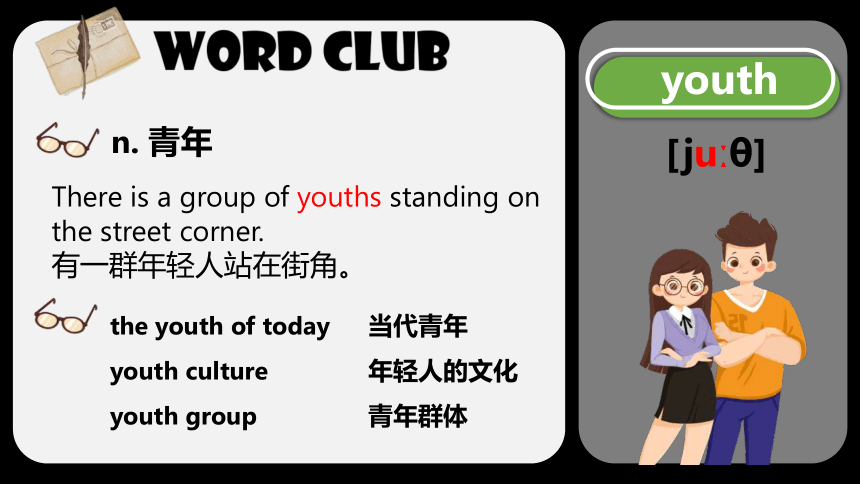
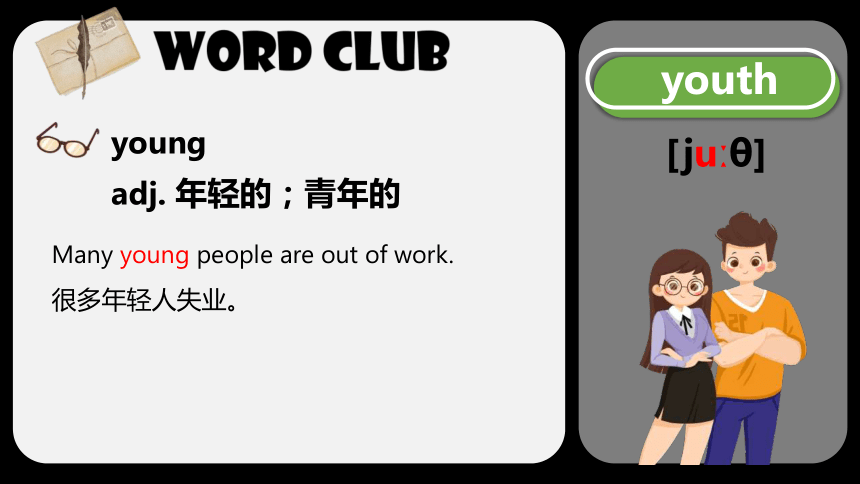
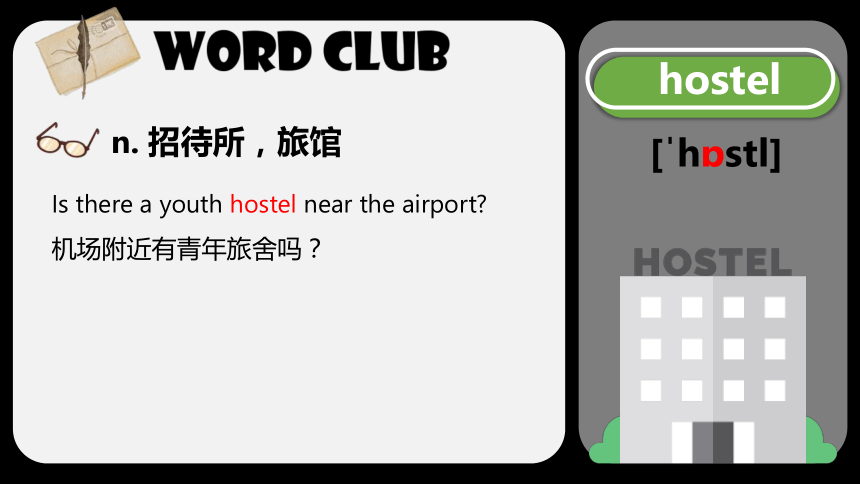
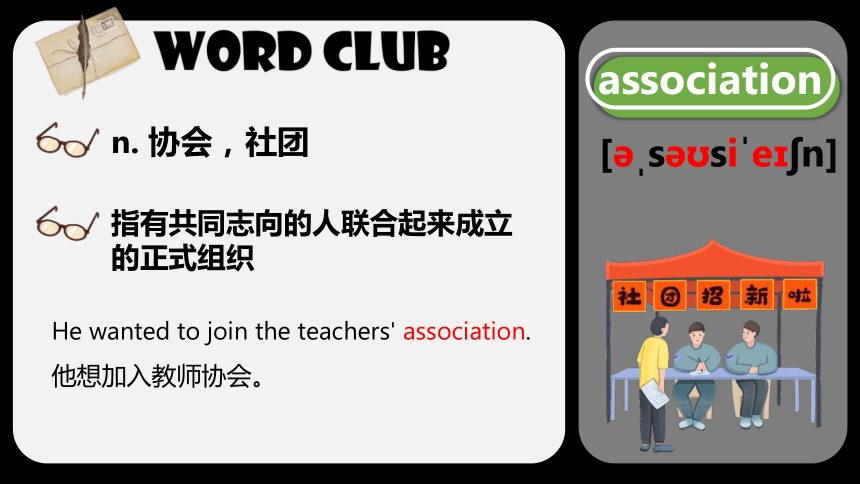
文档简介
(共41张PPT)
What is the man talking about
What is the man talking about
He is talking about postcards.
Does Grandmother seem pleased
to get a card from Jimmy
Why / Why not
Does Grandmother seem pleased
to get a card from Jimmy
Why / Why not
Not really.
She doesn’t think he writes enough.
n. 苏格兰(英国)
Why don't you come up to Scotland for a
few days 你为何不上苏格兰来住几天?
Scotland
[ sk tl nd]
英国(UK)全称“The United Kingdom
of Great Britain and Northern Ireland
(大不列颠及北爱尔兰联合王国)”,
由英格兰、苏格兰、威尔士和北爱尔兰四个政治实体组成。
n. 明信片
She sends me a card on my birthday.
我过生日时她寄来一张贺卡。
card
[kɑ d]
a piece of card 一张卡片纸
a membership card 会员卡
a birthday card 生日贺卡
a pack of cards 一副纸牌
a credit card 一张信用卡
n. 青年
There is a group of youths standing on the street corner.
有一群年轻人站在街角。
youth
[ju θ]
the youth of today 当代青年
youth culture 年轻人的文化
youth group 青年群体
young
adj. 年轻的;青年的
Many young people are out of work.
很多年轻人失业。
youth
[ju θ]
n. 招待所,旅馆
Is there a youth hostel near the airport
机场附近有青年旅舍吗?
hostel
[ h stl]
n. 协会,社团
He wanted to join the teachers' association.
他想加入教师协会。
association
[ s si e n]
指有共同志向的人联合起来成立的正式组织
club n. 俱乐部,社团
We had lunch at the golf club.
我们在高尔夫球俱乐部吃的午饭。
association
[ s si e n]
指有着共同兴趣的人为了一起进行社交、娱乐、体育等活动而结成的组织
adv. 不久
We'll be home soon.
我们很快就要到家了。
soon
[su n]
the sooner the better
尽早;越快越好
When shall I tell him 我什么时候告诉他呢?
The sooner the better. 越快越好。
sooner or later
迟早;早晚有一天
You will understand it sooner or later.
总有一天你会明白的。
soon
[su n]
v. 写
wrote [r t]
written [ r tn]
Write your name at the top of the paper.
请把名字写在纸的顶端。
write
[ra t]
write to sb 写信给某人
Please write to us at the above address.
请按上述地址来函。
write
[ra t]
write sth down 写下;记录下
Write down the address before you forget it.
把地址记下来,免得忘了。
帮奶奶阅读Jimmy的信件
write
帮奶奶阅读Jimmy的信件
card
帮奶奶阅读Jimmy的信件
hostel
帮奶奶阅读Jimmy的信件
association
帮奶奶阅读Jimmy的信件
youth
帮奶奶阅读Jimmy的信件
soon
GRANDMOTHER: Read Jimmy's card to me please, Penny.
PENNY: ‘ I have just arrived in Scotland and I'm staying at a Youth Hostel. ’
GRANDMOTHER: Eh
PENNY: He says he's just arrived in Scotland. He says he's staying at a Youth
Hostel. You know he's a member of the Y.H.A.
GRANDMOTHER: The what
PENNY: The Y.H.A. , Mum. The Youth Hostels Association.
GRANDMOTHER: What else does he say
PENNY: ‘ I'll write a letter soon. I hope you are all well. ’
GRANDMOTHER: What Speak up, Penny. I'm afraid I can't hear you.
PENNY: He says he'll write a letter soon. He hopes we are all well.
‘ Love, Jimmy. ’
GRANDMOTHER: Is that all He doesn't say very much, does he
PENNY: He can't write very much on a card, Mum.
Read and learn
‘I have just arrived in Scotland and I’m staying at a Youth Hostel.’“我刚到苏格兰,现住在一家青年招待所。”
这是一个直接引语的句子。直接引语是英语中用书面语的形式来表达口语的方式,实际讲的话要放在引号之间,句尾的标点符号也要放在引号之内。
arrive in ...意为“到达;抵达”,in后接一些大的地点比如:
国家,城市等。
She'll arrive in America at noon. 她将在正午抵达美国。
Can we arrive in Beijing on time or not
我们能否按时到达北京?
GRANDMOTHER: Read Jimmy's card to me please, Penny.
PENNY: ‘ I have just arrived in Scotland and I'm staying at a Youth Hostel. ’
GRANDMOTHER: Eh
PENNY: He says he's just arrived in Scotland. He says he's staying at a Youth
Hostel. You know he's a member of the Y.H.A.
GRANDMOTHER: The what
PENNY: The Y.H.A. , Mum. The Youth Hostels Association.
GRANDMOTHER: What else does he say
PENNY: ‘ I'll write a letter soon. I hope you are all well. ’
GRANDMOTHER: What Speak up, Penny. I'm afraid I can't hear you.
PENNY: He says he'll write a letter soon. He hopes we are all well.
‘ Love, Jimmy. ’
GRANDMOTHER: Is that all He doesn't say very much, does he
PENNY: He can't write very much on a card, Mum.
Read and learn
He says he’s just arrived in Scotland.
他说他刚到苏格兰。
He says he’s staying at a Youth Hostel.
他说他现在住在一家青年招待所。
My mother says she will fly to Beijing this Friday.
He says he has just watched an interesting film.
这两个都是含有间接引语的句子。在英语中,如果要把某人所说的话告诉另一个人,要用间接引语,间接引语不用引号。
若间接引语中的引述动词是现在时,那么其后的时态通常与原
来口头陈述句的时态相同,转述刚刚说完的话通常皆如此。如:
GRANDMOTHER: Read Jimmy's card to me please, Penny.
PENNY: ‘ I have just arrived in Scotland and I'm staying at a Youth Hostel. ’
GRANDMOTHER: Eh
PENNY: He says he's just arrived in Scotland. He says he's staying at a Youth
Hostel. You know he's a member of the Y.H.A.
GRANDMOTHER: The what
PENNY: The Y.H.A. , Mum. The Youth Hostels Association.
GRANDMOTHER: What else does he say
PENNY: ‘ I'll write a letter soon. I hope you are all well. ’
GRANDMOTHER: What Speak up, Penny. I'm afraid I can't hear you.
PENNY: He says he'll write a letter soon. He hopes we are all well.
‘ Love, Jimmy. ’
GRANDMOTHER: Is that all He doesn't say very much, does he
PENNY: He can't write very much on a card, Mum.
Read and learn
You know he’s a member of the Y.H.A.
您知道,他是Y.H.A的一个成员。
the Y.H.A = the Youth Hostels Association
青年招待所协会,简称Y.H.A.。
Youth Hostel是一种为参加野外探险度假活动的青年人提供廉价住宿的招待所。这种青年招待所实行会员制,首先要加入Y.H.A才有资格享受这种待遇。
You know he’s a member of the Y.H.A.
您知道,他是Y.H.A的一个成员。
a member of ... 表示“......的成员/ 一员”。
Today you will become a member of our team.
今天你将成为我们队的一员。
He's a member of the Church of England.
他是英国国教会的一员。
GRANDMOTHER: Read Jimmy's card to me please, Penny.
PENNY: ‘ I have just arrived in Scotland and I'm staying at a Youth Hostel. ’
GRANDMOTHER: Eh
PENNY: He says he's just arrived in Scotland. He says he's staying at a Youth
Hostel. You know he's a member of the Y.H.A.
GRANDMOTHER: The what
PENNY: The Y.H.A. , Mum. The Youth Hostels Association.
GRANDMOTHER: What else does he say
PENNY: ‘ I'll write a letter soon. I hope you are all well. ’
GRANDMOTHER: What Speak up, Penny. I'm afraid I can't hear you.
PENNY: He says he'll write a letter soon. He hopes we are all well.
‘ Love, Jimmy. ’
GRANDMOTHER: Is that all He doesn't say very much, does he
PENNY: He can't write very much on a card, Mum.
Read and learn
What else does he say
他还说了什么?
else意为“别的,其他的”,
可以用在who, what, where等疑问词后面。如:
Who else was at the party
晚会上还有谁?
Where else did you go
你还去过别的什么地方吗?
GRANDMOTHER: Read Jimmy's card to me please, Penny.
PENNY: ‘ I have just arrived in Scotland and I'm staying at a Youth Hostel. ’
GRANDMOTHER: Eh
PENNY: He says he's just arrived in Scotland. He says he's staying at a Youth
Hostel. You know he's a member of the Y.H.A.
GRANDMOTHER: The what
PENNY: The Y.H.A. , Mum. The Youth Hostels Association.
GRANDMOTHER: What else does he say
PENNY: ‘ I'll write a letter soon. I hope you are all well. ’
GRANDMOTHER: What Speak up, Penny. I'm afraid I can't hear you.
PENNY: He says he'll write a letter soon. He hopes we are all well.
‘ Love, Jimmy. ’
GRANDMOTHER: Is that all He doesn't say very much, does he
PENNY: He can't write very much on a card, Mum.
Read and learn
Speak up, Penny.
大声点。
句中的up作副词,表示强度由弱到强、由低到高。如:
Can you get up to that note
你能唱得到那么高的音吗
Can you jump up to that height
你能跳到那个高度吗?
GRANDMOTHER: Read Jimmy's card to me please, Penny.
PENNY: ‘ I have just arrived in Scotland and I'm staying at a Youth Hostel. ’
GRANDMOTHER: Eh
PENNY: He says he's just arrived in Scotland. He says he's staying at a Youth
Hostel. You know he's a member of the Y.H.A.
GRANDMOTHER: The what
PENNY: The Y.H.A. , Mum. The Youth Hostels Association.
GRANDMOTHER: What else does he say
PENNY: ‘ I'll write a letter soon. I hope you are all well. ’
GRANDMOTHER: What Speak up, Penny. I'm afraid I can't hear you.
PENNY: He says he'll write a letter soon. He hopes we are all well.
‘ Love, Jimmy. ’
GRANDMOTHER: Is that all He doesn't say very much, does he
PENNY: He can't write very much on a card, Mum.
Read and learn
Love, Jimmy.
爱你们的吉米。
这是亲人朋友之间通信时常用的结束语。
类似的表达还有:
Yours, Jimmy. 你的,吉米。
Cheers!祝健康!
All the best! 祝一切安好!
…
GRANDMOTHER: Read Jimmy's card to me please, Penny.
PENNY: ‘ I have just arrived in Scotland and I'm staying at a Youth Hostel. ’
GRANDMOTHER: Eh
PENNY: He says he's just arrived in Scotland. He says he's staying at a Youth
Hostel. You know he's a member of the Y.H.A.
GRANDMOTHER: The what
PENNY: The Y.H.A. , Mum. The Youth Hostels Association.
GRANDMOTHER: What else does he say
PENNY: ‘ I'll write a letter soon. I hope you are all well. ’
GRANDMOTHER: What Speak up, Penny. I'm afraid I can't hear you.
PENNY: He says he'll write a letter soon. He hopes we are all well.
‘ Love, Jimmy. ’
GRANDMOTHER: Is that all He doesn't say very much, does he
PENNY: He can't write very much on a card, Mum.
Read and learn
He doesn’t say very much, does he
他没写多少,是吗?
这是英语中的反意疑问句,它是由两部分组成,逗号前是一个陈述句,逗号之后是一个简略问句。如果前面一部分陈述句是肯定形式,简略问句就要用否定形式;如果前一部分是否定形式,后一部分则用肯定形式。如:
She is good at English, isn’t she 她擅长英语,不是吗?
Sam doesn't like lamb, does he 山姆不喜欢羊肉,是吗?
Would you like to dub for the story
Please prepare with your partners.
________ Jimmy’s ________ to me please, Penny.
‘I have just ____________ Scotland and I’m _____________ a Youth Hostel.’
Eh
____________ he’s just arrived in Scotland. He says he’s staying at a _______________. You know he’s _________________ the Y.H.A.
The __________
The __________, Mum. The Youth Hostel Association.
Read
card
arrived in
staying at
He says
Youth Hostel
a member of
what
Y.H.A.
What ________ does he say
‘I’ll _______________ soon. I ______ you are all _______.’
What ___________, Penny. I’m ________ I can’t hear you.
_________ he’ll write a letter soon. ___________ we are all well. ‘_____, Jimmy.’
Is that _____ He __________ say very much, ______ he
He _____________ very much on a card, Mum.
else
write a letter
hope
well
speak up
afraid
He says
all
doesn’t
He hopes
love
does
can’t write
What is the man talking about
What is the man talking about
He is talking about postcards.
Does Grandmother seem pleased
to get a card from Jimmy
Why / Why not
Does Grandmother seem pleased
to get a card from Jimmy
Why / Why not
Not really.
She doesn’t think he writes enough.
n. 苏格兰(英国)
Why don't you come up to Scotland for a
few days 你为何不上苏格兰来住几天?
Scotland
[ sk tl nd]
英国(UK)全称“The United Kingdom
of Great Britain and Northern Ireland
(大不列颠及北爱尔兰联合王国)”,
由英格兰、苏格兰、威尔士和北爱尔兰四个政治实体组成。
n. 明信片
She sends me a card on my birthday.
我过生日时她寄来一张贺卡。
card
[kɑ d]
a piece of card 一张卡片纸
a membership card 会员卡
a birthday card 生日贺卡
a pack of cards 一副纸牌
a credit card 一张信用卡
n. 青年
There is a group of youths standing on the street corner.
有一群年轻人站在街角。
youth
[ju θ]
the youth of today 当代青年
youth culture 年轻人的文化
youth group 青年群体
young
adj. 年轻的;青年的
Many young people are out of work.
很多年轻人失业。
youth
[ju θ]
n. 招待所,旅馆
Is there a youth hostel near the airport
机场附近有青年旅舍吗?
hostel
[ h stl]
n. 协会,社团
He wanted to join the teachers' association.
他想加入教师协会。
association
[ s si e n]
指有共同志向的人联合起来成立的正式组织
club n. 俱乐部,社团
We had lunch at the golf club.
我们在高尔夫球俱乐部吃的午饭。
association
[ s si e n]
指有着共同兴趣的人为了一起进行社交、娱乐、体育等活动而结成的组织
adv. 不久
We'll be home soon.
我们很快就要到家了。
soon
[su n]
the sooner the better
尽早;越快越好
When shall I tell him 我什么时候告诉他呢?
The sooner the better. 越快越好。
sooner or later
迟早;早晚有一天
You will understand it sooner or later.
总有一天你会明白的。
soon
[su n]
v. 写
wrote [r t]
written [ r tn]
Write your name at the top of the paper.
请把名字写在纸的顶端。
write
[ra t]
write to sb 写信给某人
Please write to us at the above address.
请按上述地址来函。
write
[ra t]
write sth down 写下;记录下
Write down the address before you forget it.
把地址记下来,免得忘了。
帮奶奶阅读Jimmy的信件
write
帮奶奶阅读Jimmy的信件
card
帮奶奶阅读Jimmy的信件
hostel
帮奶奶阅读Jimmy的信件
association
帮奶奶阅读Jimmy的信件
youth
帮奶奶阅读Jimmy的信件
soon
GRANDMOTHER: Read Jimmy's card to me please, Penny.
PENNY: ‘ I have just arrived in Scotland and I'm staying at a Youth Hostel. ’
GRANDMOTHER: Eh
PENNY: He says he's just arrived in Scotland. He says he's staying at a Youth
Hostel. You know he's a member of the Y.H.A.
GRANDMOTHER: The what
PENNY: The Y.H.A. , Mum. The Youth Hostels Association.
GRANDMOTHER: What else does he say
PENNY: ‘ I'll write a letter soon. I hope you are all well. ’
GRANDMOTHER: What Speak up, Penny. I'm afraid I can't hear you.
PENNY: He says he'll write a letter soon. He hopes we are all well.
‘ Love, Jimmy. ’
GRANDMOTHER: Is that all He doesn't say very much, does he
PENNY: He can't write very much on a card, Mum.
Read and learn
‘I have just arrived in Scotland and I’m staying at a Youth Hostel.’“我刚到苏格兰,现住在一家青年招待所。”
这是一个直接引语的句子。直接引语是英语中用书面语的形式来表达口语的方式,实际讲的话要放在引号之间,句尾的标点符号也要放在引号之内。
arrive in ...意为“到达;抵达”,in后接一些大的地点比如:
国家,城市等。
She'll arrive in America at noon. 她将在正午抵达美国。
Can we arrive in Beijing on time or not
我们能否按时到达北京?
GRANDMOTHER: Read Jimmy's card to me please, Penny.
PENNY: ‘ I have just arrived in Scotland and I'm staying at a Youth Hostel. ’
GRANDMOTHER: Eh
PENNY: He says he's just arrived in Scotland. He says he's staying at a Youth
Hostel. You know he's a member of the Y.H.A.
GRANDMOTHER: The what
PENNY: The Y.H.A. , Mum. The Youth Hostels Association.
GRANDMOTHER: What else does he say
PENNY: ‘ I'll write a letter soon. I hope you are all well. ’
GRANDMOTHER: What Speak up, Penny. I'm afraid I can't hear you.
PENNY: He says he'll write a letter soon. He hopes we are all well.
‘ Love, Jimmy. ’
GRANDMOTHER: Is that all He doesn't say very much, does he
PENNY: He can't write very much on a card, Mum.
Read and learn
He says he’s just arrived in Scotland.
他说他刚到苏格兰。
He says he’s staying at a Youth Hostel.
他说他现在住在一家青年招待所。
My mother says she will fly to Beijing this Friday.
He says he has just watched an interesting film.
这两个都是含有间接引语的句子。在英语中,如果要把某人所说的话告诉另一个人,要用间接引语,间接引语不用引号。
若间接引语中的引述动词是现在时,那么其后的时态通常与原
来口头陈述句的时态相同,转述刚刚说完的话通常皆如此。如:
GRANDMOTHER: Read Jimmy's card to me please, Penny.
PENNY: ‘ I have just arrived in Scotland and I'm staying at a Youth Hostel. ’
GRANDMOTHER: Eh
PENNY: He says he's just arrived in Scotland. He says he's staying at a Youth
Hostel. You know he's a member of the Y.H.A.
GRANDMOTHER: The what
PENNY: The Y.H.A. , Mum. The Youth Hostels Association.
GRANDMOTHER: What else does he say
PENNY: ‘ I'll write a letter soon. I hope you are all well. ’
GRANDMOTHER: What Speak up, Penny. I'm afraid I can't hear you.
PENNY: He says he'll write a letter soon. He hopes we are all well.
‘ Love, Jimmy. ’
GRANDMOTHER: Is that all He doesn't say very much, does he
PENNY: He can't write very much on a card, Mum.
Read and learn
You know he’s a member of the Y.H.A.
您知道,他是Y.H.A的一个成员。
the Y.H.A = the Youth Hostels Association
青年招待所协会,简称Y.H.A.。
Youth Hostel是一种为参加野外探险度假活动的青年人提供廉价住宿的招待所。这种青年招待所实行会员制,首先要加入Y.H.A才有资格享受这种待遇。
You know he’s a member of the Y.H.A.
您知道,他是Y.H.A的一个成员。
a member of ... 表示“......的成员/ 一员”。
Today you will become a member of our team.
今天你将成为我们队的一员。
He's a member of the Church of England.
他是英国国教会的一员。
GRANDMOTHER: Read Jimmy's card to me please, Penny.
PENNY: ‘ I have just arrived in Scotland and I'm staying at a Youth Hostel. ’
GRANDMOTHER: Eh
PENNY: He says he's just arrived in Scotland. He says he's staying at a Youth
Hostel. You know he's a member of the Y.H.A.
GRANDMOTHER: The what
PENNY: The Y.H.A. , Mum. The Youth Hostels Association.
GRANDMOTHER: What else does he say
PENNY: ‘ I'll write a letter soon. I hope you are all well. ’
GRANDMOTHER: What Speak up, Penny. I'm afraid I can't hear you.
PENNY: He says he'll write a letter soon. He hopes we are all well.
‘ Love, Jimmy. ’
GRANDMOTHER: Is that all He doesn't say very much, does he
PENNY: He can't write very much on a card, Mum.
Read and learn
What else does he say
他还说了什么?
else意为“别的,其他的”,
可以用在who, what, where等疑问词后面。如:
Who else was at the party
晚会上还有谁?
Where else did you go
你还去过别的什么地方吗?
GRANDMOTHER: Read Jimmy's card to me please, Penny.
PENNY: ‘ I have just arrived in Scotland and I'm staying at a Youth Hostel. ’
GRANDMOTHER: Eh
PENNY: He says he's just arrived in Scotland. He says he's staying at a Youth
Hostel. You know he's a member of the Y.H.A.
GRANDMOTHER: The what
PENNY: The Y.H.A. , Mum. The Youth Hostels Association.
GRANDMOTHER: What else does he say
PENNY: ‘ I'll write a letter soon. I hope you are all well. ’
GRANDMOTHER: What Speak up, Penny. I'm afraid I can't hear you.
PENNY: He says he'll write a letter soon. He hopes we are all well.
‘ Love, Jimmy. ’
GRANDMOTHER: Is that all He doesn't say very much, does he
PENNY: He can't write very much on a card, Mum.
Read and learn
Speak up, Penny.
大声点。
句中的up作副词,表示强度由弱到强、由低到高。如:
Can you get up to that note
你能唱得到那么高的音吗
Can you jump up to that height
你能跳到那个高度吗?
GRANDMOTHER: Read Jimmy's card to me please, Penny.
PENNY: ‘ I have just arrived in Scotland and I'm staying at a Youth Hostel. ’
GRANDMOTHER: Eh
PENNY: He says he's just arrived in Scotland. He says he's staying at a Youth
Hostel. You know he's a member of the Y.H.A.
GRANDMOTHER: The what
PENNY: The Y.H.A. , Mum. The Youth Hostels Association.
GRANDMOTHER: What else does he say
PENNY: ‘ I'll write a letter soon. I hope you are all well. ’
GRANDMOTHER: What Speak up, Penny. I'm afraid I can't hear you.
PENNY: He says he'll write a letter soon. He hopes we are all well.
‘ Love, Jimmy. ’
GRANDMOTHER: Is that all He doesn't say very much, does he
PENNY: He can't write very much on a card, Mum.
Read and learn
Love, Jimmy.
爱你们的吉米。
这是亲人朋友之间通信时常用的结束语。
类似的表达还有:
Yours, Jimmy. 你的,吉米。
Cheers!祝健康!
All the best! 祝一切安好!
…
GRANDMOTHER: Read Jimmy's card to me please, Penny.
PENNY: ‘ I have just arrived in Scotland and I'm staying at a Youth Hostel. ’
GRANDMOTHER: Eh
PENNY: He says he's just arrived in Scotland. He says he's staying at a Youth
Hostel. You know he's a member of the Y.H.A.
GRANDMOTHER: The what
PENNY: The Y.H.A. , Mum. The Youth Hostels Association.
GRANDMOTHER: What else does he say
PENNY: ‘ I'll write a letter soon. I hope you are all well. ’
GRANDMOTHER: What Speak up, Penny. I'm afraid I can't hear you.
PENNY: He says he'll write a letter soon. He hopes we are all well.
‘ Love, Jimmy. ’
GRANDMOTHER: Is that all He doesn't say very much, does he
PENNY: He can't write very much on a card, Mum.
Read and learn
He doesn’t say very much, does he
他没写多少,是吗?
这是英语中的反意疑问句,它是由两部分组成,逗号前是一个陈述句,逗号之后是一个简略问句。如果前面一部分陈述句是肯定形式,简略问句就要用否定形式;如果前一部分是否定形式,后一部分则用肯定形式。如:
She is good at English, isn’t she 她擅长英语,不是吗?
Sam doesn't like lamb, does he 山姆不喜欢羊肉,是吗?
Would you like to dub for the story
Please prepare with your partners.
________ Jimmy’s ________ to me please, Penny.
‘I have just ____________ Scotland and I’m _____________ a Youth Hostel.’
Eh
____________ he’s just arrived in Scotland. He says he’s staying at a _______________. You know he’s _________________ the Y.H.A.
The __________
The __________, Mum. The Youth Hostel Association.
Read
card
arrived in
staying at
He says
Youth Hostel
a member of
what
Y.H.A.
What ________ does he say
‘I’ll _______________ soon. I ______ you are all _______.’
What ___________, Penny. I’m ________ I can’t hear you.
_________ he’ll write a letter soon. ___________ we are all well. ‘_____, Jimmy.’
Is that _____ He __________ say very much, ______ he
He _____________ very much on a card, Mum.
else
write a letter
hope
well
speak up
afraid
He says
all
doesn’t
He hopes
love
does
can’t write
同课章节目录
